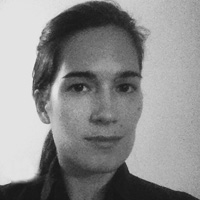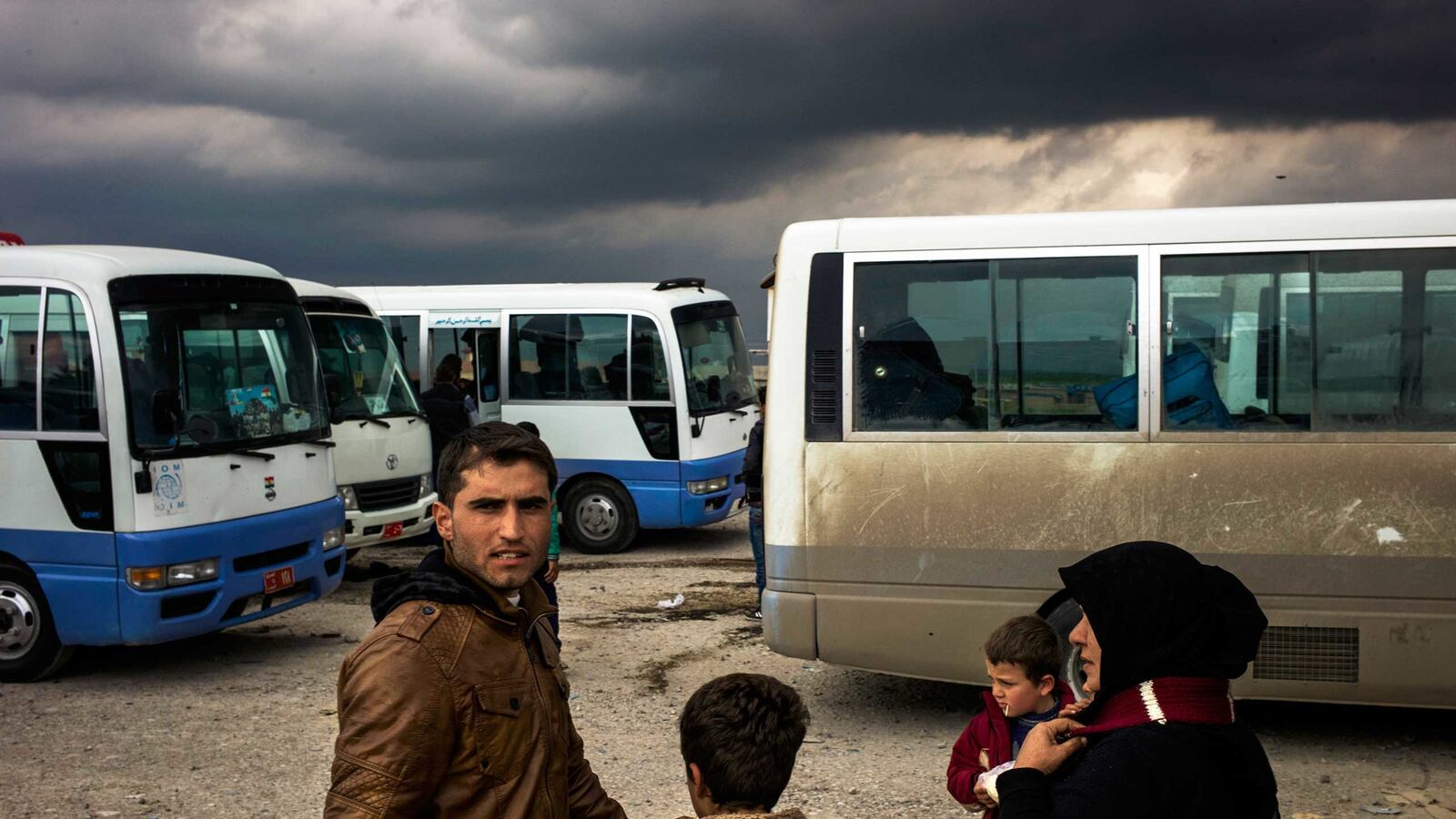PESHKHABOUR, Iraq — A brisk stretch of the Tigris River lapping at the end of a steep cement ramp serves as an official border crossing between the two war-torn countries of Syria and Iraq. Here, Syrians continue to trickle into Iraq’s Kurdish north, while a similarly steady stream make the opposite journey; returning home, in desperation. Border officials say a little more than over 200 people come and go here each day, the pulse of a protracted conflict entering its fifth year.
Amid the clamor of loading and unloading oversized suitcases, sacks of food, sleeping mattresses, kerosene heaters, and children’s toys, some families are being pulled apart at this crossing; others are reuniting with loved ones.
The majority of Syrians entering Iraq as refugees these days at Peshkhabour are from Kobani, the embattled Syrian town near the Turkish border recently wrested from Islamic State control by local Kurdish forces and U.S.-led coalition aerial bombardment. But months of deadly siege, clashes and house-to-house combat have destroyed the majority of the town’s buildings, local officials say. And many of the houses still standing have been rigged with explosives by Islamic State militants, making Kobani largely uninhabitable.
On Sunday, speaking on the fourth anniversary of the start of the civil war in Syria, Secretary of State John Kerry said the U.S. would have to negotiate with Syrian President Bashar al-Assad to find a political end to the war, which has killed more than 215,000 people and displaced millions like these refugees here.
“We were forced to leave,” said Nishan, a refugee from Kobani who spoke at the border crossing. He would speak only on condition that he would be identified with a pseudonym, fearing for the safety of his family back in Syria. Together with his sister-in-law, Jamila, and her six children, Nishan had just survived a treacherous, weeks-long journey across Syria’s front lines and through a network of checkpoints, some controlled by government forces and others by various armed opposition groups.
Nishan’s home in Kobani has been destroyed. He said that, coupled with ongoing violence in the surrounding areas and fear of extremist rule in Syria’s north and east, drove most of his family out of Syria altogether.
“We have no other option, just to leave our country and go somewhere else,” he explained.
Nishan’s brother, Rezan (also a pseudonym), the father of the six children, made the same journey just over a month ago. After finding a job in Iraq’s Kurdish north, often called Iraqi Kurdistan, he pleaded with Nishan to come too, and help reunite him with his wife Jamila and their children.
“It was hard for me to take care of all these kids during the journey,” Nishan said with a smile. “But they are my nieces and nephews, so of course, I had to.”
The children—ranging from 6 to 13 years old—stepped off the boat in silence, one after another, forming an orderly line behind their mother, helping carry the family’s luggage. Once aboard a bus that would take them to a refugee camp on the edge of Iraq’s Dohuk province, they anxiously fidgeted in their seats.
Their final destination: Erbil, the burgeoning metropolis of Iraq’s semi-autonomous Kurdistan region, where their father is been waiting for them, was still hours away.
Back at the Peshkhabour crossing, Mohammed, a refugee in his 30s from Qamishli province in northern Syria, stood on the riverbank, watching a boat leave in the opposite direction, from Iraq to Syria. Among the passengers was his sister. Struggling to hold back tears, he held his gaze until the boat disappeared behind a bend in the river.

“She has exams in Aleppo,” Mohammed said quietly. He has been living in Iraq for the past two years with his parents. While in exile, he’s only seen his younger sister for a few months at a time during her semester breaks. Aleppo, Syria’s largest city, has seen some of the conflict’s worst fighting, but his sister is determined to complete her degree in English literature, he said.
“Every time I say goodbye to her I expect she will not be back,” Mohammed said, explaining their emotional farewell. Apologizing for his tears, he said he rarely cries and never in public, explaining it’s “shameful” for Middle Eastern men to do so. Although he misses the life he had in Syria before the war, he said he is realistic about the future, which he and his sister believe lies in Iraq.
On the bus rolling though Iraq’s Dohuk province, Jamila, Nishan’s sister-in-law, said the hills almost remind her of home. Like Nishan, she spoke on the condition that she only be identified with a pseudonym. Throughout the journey, she quietly tended to her younger children as Nishan handled the necessary paperwork.
Jamila said she had mixed feelings about the trip. While she was excited to see her husband for the first time in over a month, she also knows initially, she’ll most likely have to live in a refugee camp.
“She’s not comfortable with this idea,” Nishan said.
Seemingly unaware of the long day and the trials ahead, his nieces and nephews giggled and smiled. “These kids, they don’t understand anything,” Nishan said. “They don’t know what they’re going through, they don’t understand what the situation is. They only know they’re going to see their father and they’re happy for that.”
Like many Syrian families, Nishan’s has been stretched thin by conflict. His oldest brother stayed behind in Kobani to protect the family home. The middle son, Jamila’s husband, sought work in Iraq to support the family in exile. Nishan, the youngest of the three brothers, plans to return to Syria’s Hassakeh province to finish his university studies as soon as Jamila and the children are settled.
It’s been months since they were last all together, and Nishan said he expects it to be many more months before the whole family is reunited again.
After more than four hours, the convoy of 19 buses carrying more than 300 Syrian refugees from the border arrived at the entrance of Gawilan camp, where they waited to officially register as refugees and move into the camp or continue their journeys elsewhere.
Everyone was beginning to fade. Complaining of a headache, Nishan made phone calls, trying to reach a cousin living in the camp with his family. They had not seen one another for more than a year. Jamila and her children stepped off the bus and began picking bitter greens on the side of the road. Toleke in Kurdish, similar to dandelion leaves, grows wild in northern Iraq in the spring.
“We have the same in Syria,” Jamila said, making plans for one of their first meals in the camp. “We cook it with oil and onion. I’ll make it the same way here now that I’ll have a kitchen again,” she said, referring to a makeshift kitchen in the tent where she’ll stay with her children temporarily until they hear from her husband in nearby Erbil.
“But, of course it would be better to make it at home in Syria,” she added, with a sad smile.
If it were only up to him, Nishan would not have left Syria. “For me, it would have been better to stay in my home,” in Kobani, he said. Like Mohammed, though, he saw no future for his family in Syria.
After the last round of paperwork of the day, Nishan, Jamila, and her children were bused up to a mosque where they met up with their cousins in a flurry of embraces and kisses.
Though the family’s journey is not yet over, Nissan is reenergized by the partial reunion.
“Now,” he said, smiling broadly, “I feel like everything is going to be OK.”






